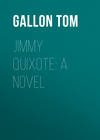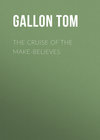Kitabı oku: «Jimmy Quixote: A Novel», sayfa 10
But the letter had one effect, and that incidentally a great one. For Mr. Purdue, after conning the letter for a long time, and clicking his tongue over it, and sighing and shaking his head, despatched it in turn to the only person he knew in London, who would be likely, as being on the spot, to give what assistance was necessary, and to take an old acquaintance by the hand. That person Charlie Purdue.
On his own account the rector sent a sovereign to Anthony Ditchburn, who under his present circumstances felt that he had tapped a gold mine. Also, the innocent rector mentioned his son's address, and begged that the eminent scholar would look the young man up. "Charlie will be glad of a solid friend," he wrote.
But long before Anthony Ditchburn had had time to enter into Charlie's life in that new and somewhat startling capacity of solid friend, Charlie himself had read his father's letter, and had, on an impulsive moment when things were wrong with him, and he had nothing very much to occupy his attention, started for Chelsea; had found the little house, and had climbed the stairs to find Moira. Of course, she knew nothing of him or of his coming; he took her unawares, in that little room wherein she spent her lonely days and her lonely evenings with the old woman.
It had been a day of misty rain and bitter wind; a day when the mere commonplace work of mean shopping had seemed more toilsome than usual. She had come home with damp skirts, and with limbs reluctant to climb the stairs; had sunk down in the firelight, and had leaned her head back and had closed her eyes. The lamp was lighted, and she was alone; for it happened that old Patience was in her bedroom, putting those little absurd touches to her dress and to her cap, without the addition of which she would not have faced the evening.
There came a tap at the door; Moira spoke wearily, although she did not turn her head; this was probably the landlady on some petty matter of the household. "Come in," she said.
The door was opened, and someone stood there. Moira waited for that someone to speak; heard a cough, and got up quickly. There, for a moment, she stood behind the lamp, looking with parted lips at the young man – fair, well-dressed, and smiling – who stood with a hand outstretched to her. Then something in the look told her who he was, whispered to her heart that here suddenly was a friend come out of the brighter world into her life. She touched his hand, and caught a sob – half of laughter, half of tears – in her throat, and whispered his name.
"Charlie!" And again, wringing his hand – "Charlie!" And yet again, almost hysterically as it seemed – "Charlie!"
CHAPTER IV
THE MAN IN PRINT
To have him standing there was wonderful; to look into his eyes, and feel his friendly clasp of her hand; to hear again the light-hearted voice and the light-hearted, gay little laugh – Well – it was just the Charlie of the woods and the fields and the sunshine of the old days. There seemed no change in him, save that he had a dainty suggestion of a moustache (she blushed that she should have noticed that, and then laughed because she had blushed), and his voice a little deeper. For the rest – simply happy-go-lucky Charlie Purdue of the woods and the fields and the sunshine.
He said over and over again that he was glad to see her; looked round the room in the firelight and lamplight, and said what a jolly place it was. And instantly it became a jolly place; the grey sobriety of it faded and was gone. The fire burnt brighter – the chairs were comfortable; it was a jolly room!
That was what Patience saw when she came in with a look of vacant surprise on her face at hearing the laughter. Came in, to be seized at once by Charlie, in that impetuous fashion of his, and kissed and hugged until the cap she had so carefully arranged was all awry. But even then it was only Charlie, and she scarcely dared frown at him.
"Well, if this isn't splendid!" he exclaimed. "To think of you being here all this time – hidden away like moles (although moles don't occupy top floors – generally – do they?) – and I knowing nothing about it. Moira grown a woman – and a pretty woman, too, my dear – and Patience looking younger than ever, especially with her cap on one side like that."
Even Patience laughed; his gaiety was infectious. She and Moira, exchanging smiles for perhaps the first time for months, bustled about to get tea ready; and Charlie Purdue, talking all the while, found out where the kettle was to be filled, and had it on the fire in no time, and assisted generally. To the scandal of old Patience (that is, had she had time to think about it), they found themselves all talking at the top of their voices, punctuated by Charlie's laughter from time to time. He had dashed in out of the world, and had seized them and shaken them, and put new life into them. Across the table under the lamp Moira found herself looking at him gratefully – telling herself, in a little whisper deep down in her heart, that the days of loneliness were over; that a friend had come to her at last, with the breath of the old days about him.
"And what are you doing, Charlie?" she asked at last.
"Oh, I'm studying medicine," he replied, with a grimace. "It was always a whim of dad's to make a doctor of me; and I hate it. It isn't what I was cut out for somehow; it's beastly work. Besides, when I'd finished boyhood I thought I'd left books behind; and here I am grinding away at them harder than ever, and trying for examinations – and – and failing," he added ruefully.
"Oh, Charlie!" The dark eyes regarded him not unkindly, but still with some reproach in their depths. And yet in a sense it was like Charlie to fail, and to laugh at the failure.
"Yes, it's true," he went on. "There seem to be so many things to be done in London, outside the work – such a fine gay life to be lived; so many people calling me here or calling me there – jolly fellows everyone. No day is long enough for all that one can crowd into it; and then the next day comes, and the work hasn't been done. But I won't talk about that to-night; there's so much else that's pleasanter to talk about. What have you been doing, the pair of you, all this time? How have you been living?"
"Our lives have been quiet ones," said Patience, a little stiffly. "I am living the life I hoped to live years ago; a life of comfort and of – of ease."
Charlie glanced at the girl quickly; then back again to the old woman. "And Moira?" he asked, "what has Moira been doing?"
"Living here – quietly," replied the girl, with a half smile at him.
"And being a bit dull, I'll be bound," he exclaimed, getting up and looking about the room impatiently. "But to-night you shan't be dull; to-night you shall taste what London is; I'll look after you."
Patience had risen swiftly to her feet; she seemed in that small room to set herself against the door, as though she would keep the girl back – as though she would keep out the roar of the great London that was calling to Moira. "She can't go!" she breathed, looking from one to the other of the eager faces.
"Can't she? Why not?" demanded Charlie, with his bright laugh. "Do you think anyone will steal her? I'll look after her; we'll go and have a little quiet dinner somewhere, and then – well, then we'll see things afterwards."
"She can't go," breathed Patience again, but in a feebler tone. "Leave her with me."
"Don't be silly, Patience; I'll bring her back safely. Why, I know every inch of this London you're so much afraid of," he went on; "I've explored places that would make you shudder even to hear about. Moira, get ready; to-night you belong to me and to me only."
Moira slipped out of the room, after hesitating for but a moment; then Patience faced the young man with a whispered question. "Where are you going to take her?" she demanded.
"The Lord only knows!" exclaimed Charlie, with a laugh. "If you're so much afraid, why don't you come yourself? Put on your bonnet, Patience, and we'll make a night of it; and you shall wear your bonnet sideways by the time you come back, I'll warrant!"
"I'll stay here," she replied. "Only remember" – she held up a warning finger, and glanced at the door – "remember that she knows nothing of this horrible city; remember that she will look on it with the eyes of a child."
"I won't open her eyes," said Charlie, with a laugh that was half subdued. "Don't you worry about nothing; give her a latchkey, and don't wait up."
"I'll wait up," replied Patience grimly.
Moira came in with her eyes glowing, and her fingers fumbling over the button of a shabby glove. Charlie took possession of the hand and the glove, and buttoned it in a desperate hurry and yet with some skill.
"We'll find a cab – (ever been in a cab, Moira?) – and we'll drive down town, and have a cosy little dinner. I think I've got money enough for that; if I haven't, I know a place where they'll trust me. I once lived a whole week on tick there. And after that – well – the night will be young – and London waiting for us! Come along!"
Moira went back at the last moment, and bent over the old woman, and kissed her. "I shan't really be late," she whispered; and wondered why Patience held to her for a moment with a clutching hand before letting her go. The last sight she had of Patience was as she looked back from the doorway; the old woman had sunk down in the chair, with her elbows on her knees, and was staring at the fire.
Outside the house the misty rain was still falling, and the wind was still coming in bursts down the little narrow street. But Moira was no longer tired nor hopeless; she would have laughed at a downpour. She eagerly slipped her hand into the crook of his elbow; they went gaily down the street together. At the end was a waiting cab – waiting because the driver had seen two young people hurrying along, laughing on such a night, and so was pretty sure of a fare. Charlie helped her in, and got in after her; gave the man an address; they were off. Bright-eyed Moira glanced round at the young man as she snuggled into her corner of the cab; laughed as the glass was let down in front of them. "It is comfortable," she said.
"Poor old girl!" he murmured under his breath, with a new note of gravity in his tone. "Why have you let her hide you away like that all this time? And fancy being so delighted over a cab ride! You seem to have plenty of money, according to what Patience wrote in a letter to the Baffalls."
"That wasn't quite true," replied the girl; "it was only a matter of pride. Patience thought people might believe that she was poor; she exaggerated a little."
"And the house? – the house that was larger than you wanted?" he asked, with a whimsical look in his eyes.
She shook her head. "It isn't our house at all; we've only got a few furnished rooms at the top of it," she replied.
"And I was thinking of coming to live with you!" he cried, with a laugh.
"Oh, Charlie!" She seized his arm, and looked round eagerly into his face. "If you only would!"
"Why – would it mean so much to you?" he asked, in a tone half of pity, half of tenderness. "I don't suppose they'd find room for me."
"It might be managed; oh, I'm sure it might be managed!" she whispered. "And you could work there – and I – we could see you often – every day."
He had no understanding of her real meaning; no knowledge of the desperate loneliness that spoke innocently in her voice and in her eyes; shallow himself, he was only vaguely flattered at her desire to see him, at her happiness in meeting him again. After all, this was something of a new sensation; this snatching up of someone out of the darkness in which she had lain hidden; this showing to her all the wonders of a world of which he had grown a little tired. He promised himself some entertainment out of it; felt that under all the circumstances he was doing rather a good and a kindly thing.
"Well, even if I don't find a room there, we must manage to see a lot of each other, Moira," he said. "You must be heartily sick of spending all your time with old Patience; I should think you must yawn your heads off every night. Or do you go out at all, as she seemed to suggest?"
"We do not go out; I've only been out once – to enjoy myself, I mean – and that was to the opera. That was wonderful!"
"Oh, there are better things than the opera, my dear," he said, with a laugh. "The opera's dull and stupid compared to other things you shall see. But here we are at my restaurant; and here you shall taste the first of your new joys. Wait till he pulls the glass up."
It was extraordinary how well Charlie seemed to be known. A smiling man, with a stiff hand to the peak of his cap, held open the door for them; another smiling man, rotund of body, was discovered bowing within the doors, and preceded them to a table in a corner; hoped that the gentleman was well, and issued sharp orders in a foreign tongue to the flying waiters. Charlie took it all as a mere matter of course; had a word or two to say about the menu, and the changing of a particular dish; and then sank down at the other side of the table. Truly a new experience to look into the dark eyes of this girl, and to see how she sat in this very ordinary restaurant with her lips parted, looking about her, and enjoying every moment of the time, even while she waited for dinner. And she was such a striking looking girl, too, he thought critically, with that black hair and those dark eyes set in her white face. No one need quarrel with him for bringing out such a girl as this; there was something attractive, in a fashion, about her very shabbiness; it gave an air to her.
She ate sparingly; there was so much to be seen – so much to which to listen. People coming and going – hurrying or taking this matter of dining easily; and beyond the doors the brightly lighted street, and all the hum and noise of a London that was making night holiday. And opposite her – here familiarly, with his eyes smiling into hers – Charlie of the pleasant smile and the pleasant voice; Charlie who had known her in the old days that his very presence recalled with a pang, and yet with a dear remembrance.
It is probable that had it been anyone else out of that old familiar life – anyone else as joyous and as glad to meet her – it would have been the same; he would have been as certain of a welcome. But it happened that Charlie was the first; and Charlie had that exquisite quality – exquisite for that time at least – that he knew how to laugh, and had found a trick of being light-hearted. The world and all it held was as much a great game to him as she had once believed it might be for her; gladly and eagerly, like a child who is taught some pleasant lesson that has less of task than of sport about it, she listened to him, and was glad to learn anything he could teach her.
He whispered whimsical surmises as to the characters of the people at the adjoining tables; set her bubbling with laughter at a humorous suggestion as to what would happen if anyone there should feel compelled to rise and give an account of himself or herself.
"You would have to confess that you had never been in a restaurant before," he whispered across the table. "How they'd stare at you!"
"So that you don't laugh at me, I don't mind," she replied. "I think I could sit here for ever – just looking at the people – and wondering about them; I don't want it ever to leave off."
He asked her if he might smoke; she nodded gravely, and smiled. He might have been surprised had he known what the savour of the smoke in her nostrils meant to her; how it breathed in a vague way of Old Paul and his pipe on far-off evenings, and of a thousand things for which she had longed. Then at last the time came for him to pay the reckoning, and for them both to go. She rose with something of a sigh; but all was not over yet.
As they came out of the place, he took her by the elbow and turned her sharply off down the street; dodged with her carefully and yet laughingly through a press of traffic; and stopped with her before the doors of a brilliantly lighted building, outside which hung posters and photographs of all shapes and sizes and sorts. Before she had time to utter a word he had hurried her inside, and had stopped at a little ticket office, from out of which a man looked at him; then had put down money, and had taken up two printed slips. Only then, when he stood before her looking at the numbers on the slips, did she venture a remonstrance.
"What place is this? You know I ought – I really ought to be going home."
"We shan't stay half an hour if you don't like it," he replied lightly. "I told you we were going to see life to-night; this is Bohemia, Moira, though with rather a small 'b,' I'm afraid. There's nothing to be afraid of."
They went down carpeted stairs, and in a moment Moira found herself sinking back luxuriously into a cushioned seat, with Charlie beside her. For a moment, a little bewildered and a little frightened, she looked about her with the air of one who had dropped into new and strange surroundings by the merest chance. Someone was singing on the stage; and voices up above had taken up the refrain of the song raucously and altogether out of tune; as the song ceased, she heard shrill whistlings and shouts and the clapping of hands.
"You'll hear something better than this presently," Charlie murmured in her ear; and she woke with a start, and tried to concentrate her thoughts on what was passing on the stage.
Charlie was still smoking; indeed, most of the men round about in the other seats were doing the same. Moira became aware, after a moment or two, that a fat heavy man a seat or two removed from her had leaned forward, and was staring at her; she averted her eyes, and glanced round towards Charlie. For his part, that young man was so engrossed with what was passing on the stage that he had removed his cigar from a mouth that was wide open, while his eyes were crinkled up in laughter. On the stage a diminutive man was hopping about with eccentric gestures, sparring at nothing, and occasionally holding a one-sided sort of interview with the conductor of the orchestra; yet he must have been funny, or why was Charlie so convulsed, and why were the other faces at which the girl glanced timidly, addressed to the stage and convulsed also. Moira decided that there must be something missing in her; the better to please Charlie, she made a feint of laughing also.
After a time it was obvious that Charlie tired a little of the performance; once or twice he glanced at the girl, as though on the point of suggesting that they should go, and yet, in his good nature, unwilling to cut short her pleasure. At last, however, he leaned towards her, and whispered:
"Tired of it?"
"There's rather a lot, Charlie – for all at once," she whispered; and the next moment, taking her at her word, he was walking out of the place with her.
"You mustn't have too much Bohemia all at once, miss," said Charlie, beckoning to a hansom. "You won't sleep after this. We'll take our London in doses, and you shall learn as much of it as you like to learn. Now for home – and Patience – and perhaps a lecture."
They drove home in comparative silence. More than once it was in her mind to say something to him in the way of thanks – to tell him what a night this had been in her life. But she checked herself, partly from shyness, partly because, although this was the Charlie of old days, there was yet the difference between the boy who had known nothing and the man who had learned so much. Only when they got out of the cab, and stood together for a moment at the door of the little house in Locker Street, did she put out her hand to him, and murmur a word of thanks.
"Thank you, Charlie," she whispered. "It has been wonderful. The beautiful dinner – and the lights and the music – . Thank you."
They heard the steps of the old woman in the house, coming down the last few stairs, and approaching the door. For a moment, as Charlie held her hand, and saw the flushed, grateful face before him, he drew that hand towards him, and bent his head to her; she, puzzled a little, drew back. If he had meant to kiss her he repented of the thought, or decided that the time was not yet; he laughed, and shook the hand, and the next moment had jumped into the cab, and was away. And the dark house swallowed her up.
Patience said nothing while the girl chattered on lightly about all that had happened, and about how kind Charlie had been, and how good-natured; Patience merely looked at her from under brooding brows, and made the simple preparations for bed. But an hour or two afterwards the old woman stole softly into the room where the girl lay asleep; shading the candle, she looked down and saw that Moira's face, even in sleep, was smiling, and that there was a flush upon it.
In just such a fashion, had the girl but known it, the old woman had looked down at her often and often while she slept; for only at that time, when Moira lay unconscious, could the deep, strong love of the woman flash out of her eyes, and set itself in the firm lines of the mouth, without the possibility of betrayal. Now, as she looked down at the face, she saw upon it that smile it had not worn before; knew what had come into the girl's life, and vaguely dreaded it. She went softly from the room, and closed the door; outside, she looked at the candle flame, and shook her head.
"She's slipping from me – she's slipping from me," she whispered.
Meanwhile Charlie had gone home – thinking, in his own careless fashion as he went, what a queer evening it had been, and what queer company he had kept. It would be untrue to say that Moira had made any impression upon him, in an active sense; it simply happened that, in his own careless, good-natured fashion, he was sorry for her, and thought it a shame that she should have been kept away from all the good things of life so long. He remembered that she had grown prettier even than he should have thought possible; had noted with approval that there was an air of grace and refinement about her which he rather liked. He would see her again – and that soon.
Charlie got out of his cab, and climbed the stairs to his rooms. Reaching the top stair in the semi-darkness, he stumbled over someone sitting there – someone asleep by the startled sounds he made as he got up. Charlie saw that it was an old man, who, in the confusion of the moment, had pulled off his hat, and was bowing and scraping before the younger one.
"Who are you?" asked Charlie, staring at him.
"I think you will remember me, Mr. Purdue," replied the quavering voice, "although it is years since we met. You were a child then – and I had the felicity of calling you by your Christian name. Years have gone by, and while fortune has raised you – (as I am sure you must deserve) – to a position of affluence – it has seen fit to cast me down, and in a sense, to trample upon me. But I thought that if I might – "
By that time Charlie had got the door open, and had gone in and turned up the gas. Facing about there, he saw that the old man had come into the doorway, and was standing watching him; and then in a moment, somewhat ruefully, Charlie recognised him.
"Why – it's old Ditchburn – . I beg your pardon; I should have said Mr. Ditchburn. Come in. How did you find me out?"
Anthony Ditchburn came into the room humbly, and looked about with the air of one who was sizing things up, with a view to the value, in a pecuniary sense, of the man who lived there. "Your esteemed father was so good as to suggest that I might call and see you," he said.
"Very kind of my esteemed father," said Charlie, looking at the old man doubtfully. "Would you mind shutting the door; then you can come in and talk."
Anthony Ditchburn, nothing loth, closed the door with alacrity, and came into the room. Charlie saw how ragged and unkempt the man was; noted in a quick glance all the little devices of poverty for the saving of his dress and the covering of worn seams and threads; he mentally decided that Mr. Ditchburn would probably endeavour to "touch him" for something before he departed.
"My dear young friend," began Anthony, in that querulous, whining tone he had learned to adopt, "I am indeed glad to look upon your face again. The world has gone hardly with me; it may astonish you to know that I have not at times had sufficient to eat. I wrote to your dear father, and he was so good as to send me a little temporary assistance – merely as a loan, of course."
"Look here," broke in Charlie, hurriedly, "if you're thinking of that sort of thing, I may tell you at once that it's no good. I wouldn't hurt your feelings for the world – but I have a devil of a fight to get along on my small allowance; because, you see, a man of my age wants enjoyment – must have it, in fact."
Mr. Ditchburn drew himself up somewhat haughtily; strength was his, because he had not yet exhausted the sum sent him by the Rev. Temple Purdue. "I do not come here to beg," he said; "this is merely a friendly visit."
"That's all right," said Charlie, with an abashed laugh. "But it's just as well to have a clear understanding at the beginning – isn't it? Will you have a drink?"
"I will swallow my pride, young sir – and I will take refreshment with you," said Mr. Ditchburn solemnly.
"You needn't – if it hurts you at all," retorted Charlie, as he opened a cupboard and took out bottles and glasses. "Help yourself."
Mr. Ditchburn helped himself liberally, and sat down; Charlie, philosophically understanding that he was in for an hour or two of the man's company, mixed for himself, and sat down also. When he produced a tobacco jar and a pipe Anthony's lean fingers twitched; he found from somewhere about his soiled dress a blackened old briar pipe, and ostentatiously blew through it to show that it was empty. Charlie pushed the tobacco across the table.
"I doubt if I shall like your mixture," said Anthony, fingering it, "but tobacco in any form appeals to me." He filled the pipe, and lighted it, and sucked at it meditatively.
During the next hour or so he mumbled over the pipe – removing it occasionally from between his teeth to utter some scathing criticism of the world and the world's methods – methods by which he had suffered. Charlie nodded fast to slumber, but woke himself now and then with a jerk, to answer vaguely some question that had been put to him fiercely by the old man. At last, as it grew on to one o'clock in the morning, and Anthony Ditchburn, having mixed himself many doses, and having also dug deep into the tobacco jar, was stretching out more comfortably in his chair, Charlie rose to his feet, and yawned, and looked despairingly at the clock.
"I'm very sorry," he said, "but I've got a lecture in the morning, and I've got to turn out early. I'm dead tired; I shall go to bed."
"Don't let me detain you," said Mr. Ditchburn, a little thickly.
Charlie stared at him in perplexity. "Yes, but – I can't very well leave you here; it isn't – isn't exactly polite," he said.
"Do not waste politeness on me," retorted Anthony, wagging his head at the fire, which had died down almost to nothing. "I am not used to it. If you insist upon my leaving you, I shall in all probability be discovered in a comatose state in the streets by some benevolent policeman; it is too far for me to walk to my humble lodging to-night – and cabs I cannot afford. Surely I am doing no harm in remaining here?" he added, stretching out his hand, and looking round at the young man. "Let me at least remain where I am warm; I can sleep anywhere. This chair is very comfortable – and I can reach the coal to replenish the fire without moving. Good-night!"
Charlie would have removed the decanter with the remaining whisky in it before going, but at the very moment that he stretched out a hand for it Anthony Ditchburn also reached out towards it to replenish his glass. Charlie good-humouredly shrugged his shoulders, and went to bed.
In the morning, when he came out to his breakfast, he discovered the decanter empty, and the room thick with the fumes of stale tobacco; Anthony had apparently been smoking and drinking all night. He blinked red eyes at Charlie, and smacked his dry lips, and watched the preparations for breakfast; he looked more shabby and unkempt than ever in the morning light. He sat down unbidden with his unwilling host; ate substantially, and had almost to be turned out of the place by force at last. But he went finally, and Charlie congratulated himself on the fact that he had got rid of him.
He had yet to learn that Anthony Ditchburn could stick like the proverbial leech, and could bleed his victim as voraciously. He came again and again; was to be found, miserably cold, upon the stairs at unseasonable hours; even when sent away he left behind him the whining threat that he would be found dead in the street, and that his blood would be upon the head of Charlie Purdue. The persecution became so great at last that it roused Charlie to do that which he had been half-shamefacedly contemplating for some time. So that in the end it may be said that this miserable whining creature, with his tales of wrongs done him, and benefits withheld, became in a sense the pivot round which the tragedy was to revolve.
Charlie came up one evening to the lamp-lit room where Moira and Patience were seated; he was bubbling over with excitement and suppressed laughter. As he came in Moira noted something about him, and spoke of it at once.
"Why, Charlie – where's your hat?" she asked.
Charlie chuckled. "It's downstairs," he said.
The two women, young and old, turned to look at him; Moira breathlessly repeated the word. "Downstairs?"
"Yes; I thought I should surprise you," exclaimed Charlie. "I've taken the two empty rooms below; father's been hammering it into me ever so long – thought the other place wasn't respectable. I did it quietly, so as to surprise you; I moved in my books and things this afternoon. Now you'll have to look after me, Moira, and see that I work."










